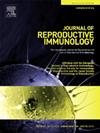Inhibition of interleukin-1 signaling protects against Group B streptococcus-induced preterm birth and fetal loss in mice
IF 2.9
3区 医学
Q3 IMMUNOLOGY
引用次数: 0
Abstract
Group B streptococcus is a common microbial agent associated with spontaneous preterm birth and fetal inflammatory response syndrome. In this study, we evaluated the utility of rytvela, a novel peptide antagonist of the interleukin-1 receptor, to suppress inflammatory activation, prolong gestation and improve neonatal outcomes induced in mice by Group B streptococcus. Pregnant mice were administered rytvela or PBS on gestation day 16.5, immediately prior and following surgical administration of heat-killed Group B streptococcus (hkGBS) or PBS into the uterine cavity. Treatment with rytvela prevented preterm delivery and alleviated fetal demise in utero and in the perinatal phase elicited by hkGBS. Compared to pups exposed to hkGBS alone, pups of dams co-administered rytvela exhibited substantially improved survival and growth through to weaning. Analysis by qPCR showed expression of inflammatory cytokine genes Il1b, Il6, Tnf, and Ifng in uterine tissues, and Il1b, Il6, and Tnf in fetal membranes, were stimulated by hkGBS and this increase was suppressed by co-administration of rytvela. Premature induction of uterine activation gene Ptgs2 in the myometrium was also attenuated by rytvela treatment. These data show that activation of IL1-mediated signaling in response to Group B streptococcus triggers an inflammatory cascade that causes preterm parturition and fetal inflammatory injury, and that rytvela can suppress inflammatory mediators to substantially improve pregnancy and fetal outcomes. Our findings add to accumulating evidence supporting clinical investigation of rytvela for fetal protection and delaying preterm birth.
抑制白细胞介素-1 信号传导可防止 B 组链球菌诱发小鼠早产和胎儿死亡
B群链球菌是一种常见的微生物病原体,与自发性早产和胎儿炎症反应综合征有关。在这项研究中,我们评估了rytvela(一种白细胞介素-1受体的新型肽拮抗剂)在抑制B组链球菌诱导的小鼠炎症激活、延长妊娠期和改善新生儿结局方面的效用。在妊娠第16.5天,在手术前和手术后立即将热杀B组链球菌(hkGBS)或PBS注入子宫腔,给予妊娠小鼠rytvela或PBS。rytvela治疗可预防早产,减轻hkGBS引起的宫内和围产期胎儿死亡。与单独暴露于hkGBS的幼崽相比,大坝共同施用rytvela的幼崽在断奶前表现出明显改善的生存和生长。qPCR分析显示,hkGBS刺激子宫组织中炎症细胞因子基因Il1b、Il6、Tnf和Ifng的表达,并刺激胎膜中Il1b、Il6和Tnf的表达,而联合给药rytvela抑制了这种表达。子宫肌层中子宫激活基因Ptgs2的过早诱导也被rytvela治疗减弱。这些数据表明,在B群链球菌的作用下,il - 1介导的信号被激活会引发炎症级联反应,导致早产和胎儿炎症损伤,而rytvela可以抑制炎症介质,从而显著改善妊娠和胎儿结局。我们的发现增加了支持rytvela用于胎儿保护和延迟早产的临床研究的证据。
本文章由计算机程序翻译,如有差异,请以英文原文为准。
求助全文
约1分钟内获得全文
求助全文
来源期刊
CiteScore
6.30
自引率
5.90%
发文量
162
审稿时长
10.6 weeks
期刊介绍:
Affiliated with the European Society of Reproductive Immunology and with the International Society for Immunology of Reproduction
The aim of the Journal of Reproductive Immunology is to provide the critical forum for the dissemination of results from high quality research in all aspects of experimental, animal and clinical reproductive immunobiology.
This encompasses normal and pathological processes of:
* Male and Female Reproductive Tracts
* Gametogenesis and Embryogenesis
* Implantation and Placental Development
* Gestation and Parturition
* Mammary Gland and Lactation.

 求助内容:
求助内容: 应助结果提醒方式:
应助结果提醒方式:


